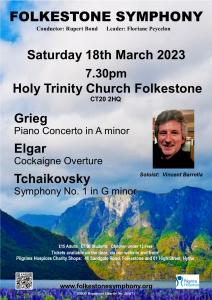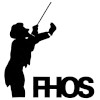Spring Concert - Saturday, 18th March 2023

Elgar - Cockaigne Overture
Grieg - Piano Concerto in A minor
- Soloist: Vincent Barrella
Tchaikovsky - Symphony No. 1 in G minor "Winter Dreams"
Holy Trinity Church,
Sandgate Road,
Folkestone,
CT20 2HQ

Review
This demanding programme, so skilfully performed, admirably showed the variety and sheer delight of the romantic repertoire. In his entertaining programme-note, conductor Rupert Bond pointed out the theme of landscape reflected in all three works – Elgar’s London, Grieg’s Norway and Tchaikovsky’s ‘Winter Daydreams, and there is a nationalist theme there as well: the concerto and symphony both make conscious use of folk idioms, while Elgar, stung by the hostile reception of Gerontius (surely the greatest work ever by an English composer) as both too German and too Catholic, determined to write something ‘ cheerful and Londony, stout and steaky’.
With music by three masters of orchestration, every section of the orchestra was given the chance to shine and responded superbly whether in exposed solo lines, beautifully balanced string, brass and wind ensembles or full-orchestral passages. With such a consistently high standard of performance, it would be invidious to focus on any particular group of players, but there was some splendid playing by the horns in all three works while the percussion department – so often ignored by reviewers – heightened the drama brilliantly. Fiendish, fast, high and technically difficult violin parts were handled with ease and with a fullness of tone while the lower strings provided a rich sonority. The passages for wind showed great ensemble sensitivity, with some particularly beautiful flute playing and lyrical performances from the oboes and clarinets. The climaxes were simply thrilling, enhanced by controlled brass-playing which at no point was over-enthusiastic or raucous. Indeed, Rupert Bond managed to create a wonderful balance between sections of the orchestra, allowing the subtleties of the music to come through without in any way reducing dramatic contrasts: in fact, some of the most exquisite, controlled playing was in the quieter, more reflective parts of each work. Notable points about the Elgar were the legato string playing and poignant melodic outpouring; the controlled and disciplined rubato; the clever echo effects; and the life-affirming ensemble passages, which even in this work had a touch of Elgarian, nobilmente melancholy. It was the dramatic variety of the Tchaikovsky which I noticed most along with the spikey string and wind playing to conjure the winter scene; great crescendos and contrasts between loud and soft; the calm but poignant melodies of the strings and horns; the rhythmic definition; and the emotional variety, from dance-like energy through dark, lugubriousness to emotional outpouring, all achieved with control and balance such is Rupert Bond’s skill as a conductor.
Vincent Barrella’s performance of the Grieg Piano Concerto demonstrated his consummate pianistic skill, with faultless articulation in the crisp runs and arpeggio passages alongside powerful, sonorous chordal sections. This was, however, not just a bravura demonstration of technical prowess, but a thoughtful and sensitive performance, with great variety of tonal colour and the ability to work with the orchestra rather than dominate it: the exchange of themes between orchestra and soloist was handled brilliantly and, though occasionally the solo part was overwhelmed by the full orchestral sound, orchestra and pianist worked together, with the piano part at times simply being part of the overall musical effect. I was particularly impressed by the variety of expression in the cadenza of the first movement while in the more lyrical sections, especially in the second movement, Vincent played with a sublime delicacy. He gave the rumbustious, danse-macabre theme of the final movement an energetic, jagged quality, followed by some compelling pianissimo playing: the contrasts in mood Vincent created through the work were quite remarkable. This was an extraordinarily fine performance of great musicality by a highly accomplished soloist supported by equally sensitive, collaborative orchestral playing.
It was delightful to see so many people at this first-rate performance of hugely enjoyable works, which are nonetheless extremely demanding to perform. Folkestone is indeed fortunate to have such a fine orchestra and Rupert Bond and leader Floriane Peycelon can once again be proud of their achievement.
Jonathan Watts,
Lark Reviews
